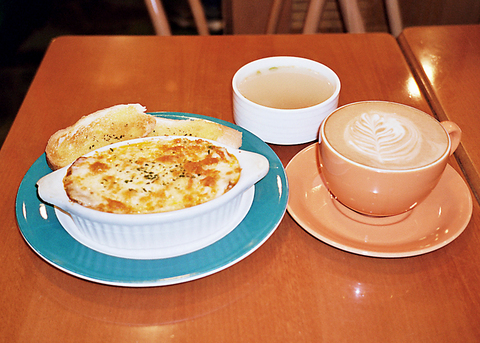Let's cut to the chase: 56 Cafe has, quite possibly, the best cup of coffee in Taipei and is my favorite place to eat in Dazhi. That's saying a lot, because I drink a lot of coffee, and Dazhi -- nestled somewhere between the old Martyr's Shrine and the new Mirimar / Warner Village -- has scores of places to eat.
Three things have made 56 Cafe a favorite of the university and high-school students that haunt Dazhi: a comfortable and pleasant atmosphere, decent food and great coffee.

PHOTO COURTESY OF 56 CAFE
The pleasant environment is a reflection of the owner, Tony Yang (楊仲賢), who took over the business from his dad six years ago. At that time, Tony turned what was basically a standard Chinese eatery into a place that looked and felt more like a Western-style coffeehouse. The result is a bright and welcoming cafe where you can enjoy a noon meal or relax with an afternoon au lait or latte.
56 Cafe, as the name might imply, serves a variety of snacks, set meals and desserts.
At lunchtime, the set meals -- which include soup and tea -- are especially popular with frequent customers. Among the standard meals is the braised beef with rice (紅燒牛腩飯, NT$100). Many people also like the deep fried pork cutlet with rice (法式黃金炸豬排).
All of the set meals are made fresh each day, so they don't have that prefabricated taste found at other hash houses.
Regular clients hold out for the daily specials, which include the local version of beef bourguignon (紅酒牛肉, NT$130) and mushroom chicken (香菇燉雞, NT$120).
But if you just want to relax with a cup of coffee, the off-peak hours are the best time to go. The lunch crowd clears out about 1:30pm and you can relax and enjoy your java in peace while listening to smooth jazz. The afternoon is also when 56 Cafe offers coffee and dessert specials.
For those who like the straight-up cup of joe, the cafe Americano (NT$55) is a good deal, better and less bitter than that offered by the look-alike coffee chains.
For those who like more milk with their coffee, 56 offers cafe au lait (NT$75) made with French roast coffee; it also offers cafe latte (NT$75) made with espresso. For a special treat, try the Indian cafe (NT$85) made with a double shot of espresso, a dash of salt and a taste of honey.
The facts that Tony knows the difference and makes each cup himself shows his commitment to quality -- and to his loyal customers.

Growing up in a rural, religious community in western Canada, Kyle McCarthy loved hockey, but once he came out at 19, he quit, convinced being openly gay and an active player was untenable. So the 32-year-old says he is “very surprised” by the runaway success of Heated Rivalry, a Canadian-made series about the romance between two closeted gay players in a sport that has historically made gay men feel unwelcome. Ben Baby, the 43-year-old commissioner of the Toronto Gay Hockey Association (TGHA), calls the success of the show — which has catapulted its young lead actors to stardom -- “shocking,” and says

The 2018 nine-in-one local elections were a wild ride that no one saw coming. Entering that year, the Chinese Nationalist Party (KMT) was demoralized and in disarray — and fearing an existential crisis. By the end of the year, the party was riding high and swept most of the country in a landslide, including toppling the Democratic Progressive Party (DPP) in their Kaohsiung stronghold. Could something like that happen again on the DPP side in this year’s nine-in-one elections? The short answer is not exactly; the conditions were very specific. However, it does illustrate how swiftly every assumption early in an

Inside an ordinary-looking townhouse on a narrow road in central Kaohsiung, Tsai A-li (蔡阿李) raised her three children alone for 15 years. As far as the children knew, their father was away working in the US. They were kept in the dark for as long as possible by their mother, for the truth was perhaps too sad and unjust for their young minds to bear. The family home of White Terror victim Ko Chi-hua (柯旗化) is now open to the public. Admission is free and it is just a short walk from the Kaohsiung train station. Walk two blocks south along Jhongshan

Francis William White, an Englishman who late in the 1860s served as Commissioner of the Imperial Customs Service in Tainan, published the tale of a jaunt he took one winter in 1868: A visit to the interior of south Formosa (1870). White’s journey took him into the mountains, where he mused on the difficult terrain and the ease with which his little group could be ambushed in the crags and dense vegetation. At one point he stays at the house of a local near a stream on the border of indigenous territory: “Their matchlocks, which were kept in excellent order,